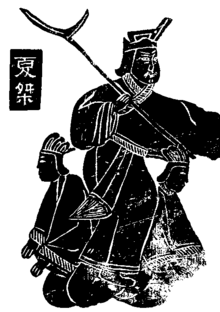Jie (Xia King)

King Jie ( Chinese 桀 , Pinyin Jié , W.-G. Chieh ) of Xia was the last ruler of the Xia dynasty in China . He will be held responsible for her case.
King Jie ruled tyrannically and abused the people. The records of the later Qin Dynasty report that the country experienced a morning frost in July during his final year of reign. Heavy rains washed the houses away, hot and cold weather alternated chaotically, and the crops spoiled. Some scientists link these events with the worldwide recorded climate anomaly of the 1620s BC. BC, which was possibly caused by the Minoan eruption on the volcanic island of Santorini .
Around 1700 BC BC Cheng Tang , the leader of the Shang in the east, defeated King Jie and destroyed the Xia dynasty. He founded the Shang Dynasty .
The historian Sima Qian connects the origin of the Xiongnu with Chunwei, who may have been a son of King Jie. This theory has never been proven, but has not yet been refuted.
credentials
- ↑ Kevin Pang: Three Very Large Volcanic Eruptions in Antiquity and Their Effects on the Climate of the Ancient World , in: EOS (American Geophysical Union), 66 (46), 1985, p. 816.
| predecessor | Office | successor |
|---|---|---|
| fa |
King of China 1802–1752 BC Chr. |
Chengtang |
| personal data | |
|---|---|
| SURNAME | Jie |
| ALTERNATIVE NAMES | 桀 (Chinese); Jié (pinyin); Chieh (Wade-Giles) |
| BRIEF DESCRIPTION | last ruler of the Xia dynasty in China |
| DATE OF BIRTH | 18th century BC Chr. |
| DATE OF DEATH | 18th century BC BC or 17th century BC Chr. |